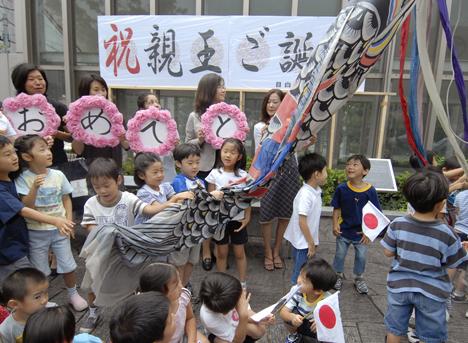Japanese celebrate male heir

The Associated Press The Associated Press
September 7, 2006
With shouts of “Banzai,” Japanese celebrated the birth Wednesday of the imperial family’s first male heir since the 1960s, squelching hopes of reform to allow women on the throne.
Princess Kiko, wife of Prince Akishino, gave birth to a boy by Caesarean section at a Tokyo hospital. The boy, who will be named on Tuesday, is Emperor Akihito’s first grandson and is third in line to the throne, behind brothers Crown Prince Naruhito and Akishino.
The news was cheered by many Japanese, who maintain an enduring respect for the imperial family more than 60 years after Emperor Hirohito renounced his status as a divinity at the end of World War II.
Newspapers published extra editions, supporters gathered outside the hospital where Kiko gave birth, and TV networks ran continuous coverage on the delivery. Fans shouted “Banzai” – “Ten Thousand Years” – outside the imperial palace.
“Not only the members of the imperial family, but all the people of Japan must have felt happy,” Prime Minister Junichiro Koizumi said. “We’re hoping for the boy’s healthy growth.”
Get The Daily Illini in your inbox!
The boy was born at 8:27 a.m. and weighed 5 pounds, 10 ounces, the Imperial Household Agency said. Both the infant and his mother were in good condition.
The arrival of a prince – the first since Akishino’s birth in 1965 – ended for now a succession crunch in the coming generation of the royal family, which traces its roots back 1,500 years. Until Wednesday, Akishino and Naruhito had three daughters between them, but no sons.
Royal watchers warned that with only one male heir in the family, the throne could face another crisis if he and his eventual wife don’t produce a son.
“The imperial family has escaped the succession crisis, but only for the moment,” said Koichi Yokota, a professor in constitutional law at Ryutsu Keizai University in Ibaraki. “The family still has only one male successor in the youngest generation, and the system is far from stable.”
The birth also was likely to put the brakes on a divisive debate over whether to change Japan’s 1947 imperial law to allow women to inherit the throne. Under that law, only men in an all-male line to the emperor can assume the crown.
While eight women have ruled as emperor over the centuries, the last taking the throne in 1762, they served mostly as placeholders until a suitable male could be found. The postwar law codified that tradition.
A high-level panel last year recommended allowing women on the throne, then letting them pass the crown to their offspring. The proposal had support from Koizumi and the public, but conservatives mounted a vociferous attack on the plan, saying it would end centuries of tradition.
The announcement of Kiko’s pregnancy slowed the idea, and Koizumi shelved the plan. Both he and his likely successor, Chief Cabinet Secretary Shinzo Abe, suggested there would be no rush to resurrect the proposal.
“It’s not something that we will submit to the next year’s parliament session,” Koizumi said. “It’s better to watch the situation calmly for a while.”
The birth took place under intense public scrutiny and expectation. News of Kiko’s pregnancy and delivery date led to rallies in shares of baby-care companies amid hopes that other Japanese would be inspired to have more children.
Kiko, who has two daughters, was hospitalized Aug. 16 after showing symptoms of partial placenta previa, in which part of the placenta drops too low in the uterus. Officials said the pregnancy was never in jeopardy.
On Wednesday afternoon, an emissary from Akihito delivered a special sword to Akishino’s residence as a symbol of protection for the infant.
Doctors said at a news conference Wednesday that Akishino and Kiko were not told the baby’s gender until birth because they had told the doctors they did not wish to know beforehand. Japanese tabloids, however, had speculated the child would be a boy.
Emperor Akihito’s eldest son, Naruhito, has a daughter – Aiko, 4 – with his wife Masako, but the couple have no sons. Masako, now 42, gave up a career in diplomacy to marry. She had a miscarriage in 1999 and has struggled with depression in recent years.
The birth set a cycle of ancient imperial ceremonies in motion.






